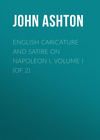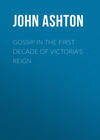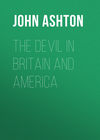Buch lesen: «English Caricature and Satire on Napoleon I. Volume I (of 2)», Seite 5
CHAPTER XIII
REPORTED ATTEMPT TO ASSASSINATE NAPOLEON – HIS AMOUR WITH MADAME FOURÉS – THE EGYPTIAN CAMPAIGN – THE ‘SAVANTS’ – CARICATURES ON THEM
The new year opens with a somewhat curious print by I. Cruikshank, January 1, 1799, of the ‘Ghost of Buonaparte appearing to the Directory.’ The latter are in fearful dismay at the apparition, which, attired in the airiest of costume, shakes his notched sword at them, saying, ‘Regicides, Parricides, Matricides, and Patricides, this is the effect of your insatiable thirst for Conquest; this is your reward for my glorious Achievements in Italy, Germany, &c. – to die by the hand of an Assassin, a d – d Mussulman: and all my Brave Legions Destroyed by Water melons and the Arabs. Go, Murderers in cold blood, may your conscious guilt ever prey upon your vitals, and may the name of Nelson ever haunt you, sleeping and waking’! What is meant by his dying ‘by the hand of an Assassin,’ I do not know; but probably some rumour was afloat to that effect, as Barre observes: ‘Whilst Buonaparte and his army were thus cut off from Europe, the most absurd reports were spread (no doubt by the partisans of the artful Corsican) representing him as a victim of the Directory, who had thought proper to remove so great, famous, and fortunate a general.
‘They pretended that the Directory, unable to repay the signal services of Buonaparte, and, fearing, at the same time, his popularity, had contrived, with Talleyrand, to flatter the ambitious vanity of that young conqueror with an expedition, which would raise his fame above the glory acquired by Alexander, or Cæsar. They added, that, as Buonaparte was sure of being director at the next election, the Directory had resolved to put him out of the way, by sacrificing him and his army; having even directed that the fleet should be exposed to certain destruction, in order that no possibility could exist of his return.’
The ‘Times’ of January 2, 1799, has the subjoined: —
The following Epigram has been handed about in Paris. The French points are all that can be remembered by the Gentleman who has put it in an English dress.
‘France, to get rid of Turbulence,
Sends her best Soldiers far from hence,
With promises, and wishes, hearty;
Pleas’d and content that what so e’er
May happen either here or there,
To hazard all in Bonâ-parte.
‘And still, though rous’d by home alarms,
Nay, threatened by the world in arms,
France holds her head up bold and hearty —
Since now each Directorial Elf,
By losing Bonaparte’s self
Enjoys the loss in Bonâ-parte.’
Meanwhile Napoleon was taking things pretty easily in Egypt, enjoying himself after his manner. It is a marvel that none of the English caricaturists ever depicted this portion of his life. True, Gillray, as we have seen, drew him in Turkish costume; but he never wore it but once, and then but for a very short time. But why did they spare him in his amour with Madame Fourés (Pauline, or Queen of the East, as the army christened her)? De Bourrienne makes no secret of it. He says: ‘About the middle of September in this year (1798), Buonaparte ordered to be brought to the house of Elfy Bey, half a dozen Asiatic women, whose beauty he had heard highly extolled. However, their ungraceful obesity displeased him, and they were immediately dismissed. A few days after, he fell violently in love with Madame Fourés,44 the wife of a lieutenant of Infantry. She was very pretty, and her charms were enhanced by the rarity of seeing a woman, in Egypt, who was calculated to please the eye of a European. Bonaparte engaged, for her, a house adjoining the palace of Elfy Bey, which he occupied. He frequently ordered dinner to be prepared there, and I used to go there with him at seven o’clock, and leave him at nine.
‘This connection soon became the general subject of gossip at head-quarters. Through a feeling of delicacy to M. Fourés, the General in Chief gave him a mission to the Directory. He embarked at Alexandria, and the ship was captured by the English, who, being informed of the Cause of his mission, were malicious enough to send him back to Egypt, instead of keeping him prisoner.’
But he was not one to waste much time in dalliance. Turkey was not at all satisfied with the occupation of Egypt, and two armies were assembled, one in Syria, and one at Rhodes; the former of which had already pushed forward into Egyptian territory as far as El-Arisch, and also a train of artillery had been placed at Jaffa (the ancient Joppa). The commander of this corps d’armée (Achmet Pacha) had earned the unenviable title of Djezzar, or the Butcher. Napoleon, very early in the year 1799, marched against him, his busy brain having schemed the plan of crushing these Turkish troops, a demonstration against Constantinople itself, a forced peace with the Porte, and then hey! for India. To pave the way for this latter he actually wrote to Tippoo Sahib, saying he was coming to deliver him from the English yoke, and requesting his answer, which he might possibly have received, had not Tippoo been killed on May 4 of that year.
Napoleon, by way of conciliating the Egyptians, assisted at the celebration of ‘Ramadan,’ with great pomp, which, naturally, would afford his detractors another opportunity for outcry at his Mahometan proclivities. As soon as it was over, he set out against Achmet Pacha, and, on February 17, El-Arisch capitulated, and the army marched to Gaza. How the vanguard lost their way, and their terrible sufferings in the desert, it boots not to tell. Gaza was taken, its stores were confiscated, and then Jaffa was their bourne, which was reached, and invested, on March 4.
Before reading the sad page of history which Jaffa gives us, let us glance at one or two caricatures which appeared in England about this time. Napoleon had taken with him, in his expedition to Egypt, Denon and divers other learned men to investigate the archæology of the country, &c., and most valuable were the services of ‘the Institute,’ as this body of savants was called. They furnished some fun to the army, and the cry, when any danger threatened, of ‘the Asses and the Savants to the centre,’ was naturally productive of mirth; the army also christening the asses ‘Demi-savants.’
Gillray makes great fun of the expedition to Egypt, and satirises the French soldiers unmercifully; nor do the poor savants who accompanied the army fare any better. A good example is the ‘Siege de la Colonne de Pompée, or Science in the Pillory,’ published March 6, 1799. At the foot of the picture is: ‘It appears by an intercepted letter from General Kleber, dated Alexandria, 5 brumaire, 7th year of the Republic, that when the garrison was obliged to retire into the New Town, at the approach of the Turkish Army, under the Pacha of Rhodes, a party of the sçavans, who had ascended Pompey’s Pillar for scientific purposes, was cut off by a Band of Bedouin Arabs, who, having made a large Pile of Straw, and dry Reeds, at the foot of the Pillar, set fire to it, and rendered unavailing the gallant defence of the learned Garrison, of whose Catastrophe the above design is intended to convey an idea.
‘To study Alexandria’s store
Of Science, Amru deem’d a bore
And briefly set it burning.
The Man was ignorant, ’tis true,
So sought one comprehensive view
Of the light shed by learning.
Your modern Arabs grown more wise,
French vagrant Science duly prize;
They’ve fairly bit the biters.
They’ve learnt the style of Hebert’s Jokes,
Amru to books confined his Hoax;
These Bedouins roast the writers.’
The savants are, indeed, in a parlous state, on the broad summit of the pillar, exposed to fire from below, and the guns and pistols of the Arabs; they defend themselves as well as possible by hurling their globes, and scientific instruments, at their assailants, who are exceedingly astonished at them. A balloon, La Diligence d’Abyssinie, is fired at, and struck, the aeronauts, one of whom has a parachute, being precipitated to the ground.
‘The Institute,’ which was modelled on that of Paris, also gave scope to Gillray’s facile pencil, and he published a series of half a dozen plates, in the first one of which it was most amusingly caricatured. It was published on March 12, 1799, and called, ‘L’Insurrection de l’Institut Amphibie – The pursuit of Knowledge.’ A savant is depicted as studying a work ‘Sur l’Education du Crocodile,’ some plates from which have dropped out. They show how useful the crocodile may become, by training, to tow vessels, and to ride and drive on land. He evidently is intending to put his theories into practice, for he has brought with him, to the river’s side, a saddle, a fearfully cruel bridle, and a huge whip, when he is seized by an enormous saurian, and devoured. Another learned man, who has been reading ‘Les Droits du Crocodile,’ drops it, when he finds one of these creatures asserting its rights by seizing his coat-tails.
CHAPTER XIV
TAKING OF JAFFA, AND MASSACRE OF SOLDIERS – DE BOURRIENNE’S ACCOUNT – NAPOLEON’S OWN VERSION
It is sad to turn from this rollicking fun to the episode of Jaffa; but it cannot be dismissed, as it has afforded so much employment to the detractors of Napoleon, and to the English satirists of the time. First of all, let us give the version of an eye-witness (De Bourrienne), friend of, and secretary to, Napoleon. It is rather long, but no word of it can be omitted, as it gives every argument that can be brought forward to palliate the sickening massacre.
‘On the 4th of March we commenced the siege of Jaffa. That paltry place, which, to round a sentence, was pompously styled the ancient Joppa, held out only to the 6th of March, when it was taken by storm, and given up to pillage. The massacre was horrible. General Bonaparte sent his aides de camp, Beauharnais and Croisier, to appease the fury of the soldiers as much as possible, to observe what was passing, and to report to him. They learnt that a considerable part of the garrison had retired into some vast buildings, a sort of caravanserais, which formed a large enclosed court. Beauharnais and Croisier, who were distinguished by wearing the aide de camp scarf on the arm, proceeded to that place.
‘The Arnauts and Albanians, of whom these refugees were almost entirely composed, cried, from the windows, that they were willing to surrender, upon an assurance that they would be exempted from the massacre to which the town was doomed; if not, they threatened to fire on the aides de camp, and to defend themselves to the last extremity. The two officers thought that they ought to accede to the proposition, notwithstanding the decree of death which had been pronounced against the whole garrison, in consequence of the town being taken by storm. They brought them to our camp in two divisions, one consisting of about two thousand five hundred men, the other of about fifteen hundred.
‘I was walking with General Bonaparte, in front of his tent, when he saw this multitude of men approaching, and, before he even saw his aides de camp, he said to me in a tone of profound sorrow, “What do they wish me to do with these men? Have I food for them? ships to convey them to Egypt or France? Why, in the Devil’s name, have they served me thus?” After their arrival, and the explanations which the General in Chief demanded, and listened to with anger, Eugene and Croisier received the most severe reprimand for their conduct.
‘But the deed was done. Four thousand men were there. It was necessary to decide upon their fate. The two aides de camp observed, that they had found themselves alone in the midst of numerous enemies, and that he had directed them to restrain the carnage. “Yes, doubtless,” replied the General in Chief, with great warmth, “as to women, children, and old men – all the peaceable inhabitants; but not with respect to armed soldiers. It was your duty to die, rather than bring these unfortunate creatures to me. What do you want me to do with them?” These words were pronounced in the most angry tone.
‘The prisoners were then ordered to sit down, and were placed, without any order, in front of the tents, their hands tied behind their backs. A sombre fury was depicted in their countenances. We gave them a little biscuit and bread, squeezed out of the already scanty supply for the army.
‘On the first day of their arrival, a council of war was held in the tent of the General in Chief, to determine what course should be pursued with respect to them. The Council deliberated a long time without coming to any decision.
‘On the evening of the following day, the daily reports of the generals of division came in. They spoke of nothing but the insufficiency of the rations, the complaints of the soldiers – of their murmurs and discontent at seeing their bread given to enemies, who had been withdrawn from their vengeance, inasmuch as a decree of death, in conformity with the laws of war, had been passed on Jaffa. All these reports were alarming, and especially that of General Bon, in which no reserve was made. He spoke of nothing less than the fear of revolt, which would be justified by the serious nature of the case.
‘The Council assembled again. All the generals of division were summoned to attend, and, for several hours together, they discussed, under separate questions, what measures might be adopted, with the most sincere desire to discover and execute one which would save the lives of these unfortunate prisoners.
‘Should they be sent to Egypt? could it be done?
‘To do so, it would be necessary to send with them a numerous escort, which would too much weaken our little army in the enemy’s country. How, besides, could they and the escort be supported till they reached Cairo, having no provisions to give them on setting out, and, their route being through a hostile territory, which we had exhausted, which presented no fresh resources, and through which we, perhaps, might have to return?
‘Should they be embarked?
‘Where were the ships? where could they be found? All our optical instruments, directed over the sea, could not descry a single friendly sail. Bonaparte, I affirm, would have regarded such an event as a real favour of fortune. It was, and I am glad to have to say it, this sole idea, this sole hope, which made him brave, for three days, the murmurs of his army. But in vain was help looked for, seawards – It did not come.
‘Should the prisoners be set at liberty?
‘They would then proceed to St. Jean d’Acre to reinforce the Pacha, or else, throwing themselves into the mountains of Naplouse, would greatly annoy our rear and right flank, and deal out death to us, as a recompense for the life we had given them. There could be no doubt of this. What is a Christian dog to a Turk? It would even have been a religious and meritorious act in the eyes of the Prophet.
‘Could they be incorporated, disarmed, with our soldiers in the ranks?
‘Here again the question of food presented itself in all its force. Next came to be considered the danger of having such comrades, while marching through an enemy’s country. What might happen in the event of a battle before St. Jean d’Acre? Could we even tell what might occur during the march? and – finally – what must be done with them when under the ramparts of that town, if we should be able to take them there? The same embarrassments with respect to the questions of provisions, and security, would then recur with increased force.
‘The third day arrived without its being possible, anxiously as it was desired, to come to any conclusion favourable to the preservation of these unfortunate men. The murmurs in the camp grew louder – the evil went on increasing – remedy appeared impossible – danger was real and imminent.
‘The order for shooting the prisoners was given and executed on the 10th of March. We did not, as has been stated, separate the Egyptians from the other prisoners. There were no Egyptians.
‘Many of the unfortunate creatures composing the smaller division, which was fired on close to the sea-coast, at some distance from the other column, succeeded in swimming to some reefs of rocks out of the reach of musket shot. The soldiers rested their muskets on the sand, and, to induce the prisoners to return, employed the Egyptian signs of reconciliation, in use in that country. They came back; but, as they advanced, they were killed, and disappeared among the waves.’
Thus far De Bourrienne. Now let us hear what Napoleon himself says of the matter.45 ‘He spoke about the measures which he had caused to be taken at Jaffa. “After the assault,” said he, “it was impossible to restore any kind of discipline until night. The infuriated soldiers rushed into the streets in search of women. You know what kind of people the Turks are. A few of them kept up a fire in the streets. The soldiers, who desired nothing more, whenever a shot was discharged, cried out that they were fired upon from certain houses, which they immediately broke open, and violated all the women they found.”
‘I replied46 that Miot … positively asserted that he (Napoleon) had caused between three and four thousand Turks to be shot, some days after the capture of Jaffa. Napoleon answered: “It is not true that there were so many. I ordered about a thousand or twelve hundred to be shot, which was done. The reason was, that amongst the garrison of Jaffa, a number of Turkish troops were discovered, whom I had taken a short time before at El-Arish, and sent to Bagdat upon their parole not to serve again, or to be found in arms against me for a year. I had caused them to be escorted twelve leagues on their way to Bagdat, by a division of my army. But those Turks, instead of proceeding to Bagdat, threw themselves into Jaffa, defended it to the last, and cost me a number of brave men to take it, whose lives would have been spared, if the others had not reinforced the garrison of Jaffa. Moreover, before I attacked the town, I sent them a flag of truce. Immediately afterwards we saw the head of the bearer elevated on a pole over the wall. Now, if I had spared them again, and sent them away upon their parole, they would directly have gone to St. Jean d’Acre, where they would have played over again the same scene that they had done at Jaffa. In justice to the lives of my soldiers, as every general ought to consider himself as their father, and them as his children, I could not allow this.
‘“To leave as a guard a portion of my army, already small and reduced in number, in consequence of the breach of faith of those wretches, was impossible. Indeed, to have acted otherwise than I did, would probably have caused the destruction of my whole army. I, therefore, availing myself of the rights of war, which authorise the putting to death prisoners taken under such circumstances, independent of the right given to me by having taken the city by assault, and that of retaliation on the Turks, ordered that the prisoners taken at El-Arish, who, in defiance of their capitulation, had been found bearing arms against me, should be selected out and shot. The rest, amounting to a considerable number, were spared. I would,” continued he, “do the same thing again to-morrow, and so would Wellington, or any general commanding an army under similar circumstances!”’
Between these two partial accounts there are grave discrepancies – both parties trying, as far as possible, to excuse the deed; but, if De Bourrienne can be relied on, his account of the cold-blooded massacre must be the true one, for he says, ‘I confine myself to those details of this act of dreadful necessity of which I was an eye-witness.’
CHAPTER XV
THE MASSACRE AT JAFFA (continued) – ENGLISH EVIDENCE THEREON – SIEGE OF ST. JEAN D’ACRE – CAPTURE OF NAPOLEON’S BATTERING TRAIN – FAILURE OF THE SIEGE, AND RETREAT TO JAFFA
It is a singular thing, that, even in the very meagre accounts, of transactions in Egypt no mention of this should have got into the English newspapers; but I have searched, and can find none. But when, in 1803, this country was in fear of invasion, it was brought up, and used with great effect, in stimulating patriotism. Take, as an instance, one47 out of the thousands of broadsides which then flooded the country, and we shall find that the fact, although broadly stated, has not been exaggerated.
‘On the 7th that town was taken by assault. This affair is on all hands allowed to have been bloody in the extreme; but a tale has been brought to light, and attested by persons of undoubted credit, so bloody, so diabolical, as to outstrip everything which such an expression is calculated to describe.
‘It is asserted that three days after the capture of the town, three thousand eight hundred prisoners were marched to a rising ground, and there massacred by means of musquetry, grape shot, and the bayonet. This fact was first made known in Europe by Sir Sidney Smith, and Mr. Morier, Secretary to Lord Elgin, now a prisoner in Paris; its history has been minutely given by Colonel Sir Robert Wilson, of Hompesch’s hussars, and its truth has been attested by Dr. Wittman who accompanied the army of the Grand Vizir.’
This Dr. Wittman was the physician to the British Military Mission, which went with that army through Turkey, Syria, and Egypt, and who wrote a narrative of his travels, in which, at p. 128, he says the unfortunates were dragged ‘to the sand hills, about a league distant, in the way to Gaza, and there most inhumanly put to death. I have seen the Skeletons of those unfortunate victims, which lie scattered over the hills; a modern Golgotha, which remains a lasting disgrace to a Nation calling itself civilised.’
Sir Robert Wilson says: ‘Vollies of musquetry and grape instantly played against them; and Buonaparte, who had been regarding the scene through a telescope, when he saw the smoke ascending, could not restrain his joy, but broke out into exclamations of approval; indeed, he had just reason to dread the refusal of his troops thus to dishonour themselves. Kleber had remonstrated in the most strenuous manner, and the officer of the Etat-Major, who commanded (for the general to whom the division belonged, was absent) even refused to execute the order without a written instruction; but Buonaparte was too cautious, and sent Berthier to enforce obedience… The bones still lie in heaps, and are shown to every traveller who arrives; nor can they be confounded with those who perished in the assault, since this field of butchery lies a mile from the town.’
Combe, of course, does not forget this incident.
Another bloody work ensued
Which the brave Nap with rapture view’d —
He near four thousand prisoners had,
The number almost drove him mad;
Because so many men to feed,
Required a deal of food indeed.
He chid his troops for being so good,
And said such mercy was of no good.
Resolv’d to get rid of his burthen,
(Tho’ Kleber ventur’d to demur then,)
He bade his troops the men surround,
And march them to a rising ground;
The soldiers did as he directed,
And they by Boney were inspected;
It seems our hero was inclin’d
If ’twas his interest, to be kind;
Now Nap, among these Captives rude,
An aged Janizary view’d;
And, with a contumacious sneer,
Said he ‘Old man, what brought you here!’
The Janizary, no way frighten’d,
Although unconscious how it might end,
Replied ‘That question soon I can, Sir,
By asking you a like one, answer,
To serve your Sultan, you’ll rejoin —
And the same answer now is mine.’
This frankness all around delighted,
And admiration, too, excited.
Behold – our very hero smiled,
As if he had been reconciled.
That smile, some whispered, is a gracious one,
This guess was not, tho’, a sagacious one;
The Janizary was not spared,
His fellow-prisoners’ fate he shared;
But previously brave Nap withdrew,
And at a distance had a view;
The signal given – none dared to stop —
The musquetry went pop – pop – pop.
Nap thro’ his spy glass marked the fun,
And cried out ‘bravo’ when ’twas done —
His soldiers, who the dead surrounded,
Humanely stabbed and killed the wounded.
Napoleon now turned his attention to the siege of St. Jean d’Acre, where the garrison had the advantage of European aid, besides which, Sir Sydney Smith cruised about the fort, and Napoleon’s battering-train, which had been captured, was duly pointed at the besiegers. He was, besides, called off to help Kleber, who was in an awkward situation at Mount Thabor, and had been fighting Achmet Pasha, who had a considerably superior force, from six in the morning till one in the afternoon. Not one moment too soon did Napoleon make his appearance; but he turned the tide of battle, and the Turks were defeated with the loss of 5,000 or 6,000 men, and all their stores, &c.
Back they went to St. Jean d’Acre, and did their best at the siege; but it was not to be. Reinforcements were thrown into the town, Napoleon’s army grew smaller, provisions got scarcer, the plague was in their midst; so, sending his sick and wounded to Jaffa, he raised the siege and began to retreat on May 20.
O’Meara tells us Napoleon’s version of the causes which led to this.48 ‘“The chief cause of the failure there was that Sir Sydney Smith took all my battering-train, which was on board of several small vessels. Had it not been for that, I would have taken Acre in spite of him. He behaved very bravely, and was well seconded by Phillipeaux, a Frenchman of talent, who had studied with me as an engineer… The acquisition of five or six hundred seamen as cannoniers, was a great advantage to the Turks, whose spirits they revived, and whom they showed how to defend the fortress.
‘“But he committed a great fault in making sorties, which cost the lives of two or three hundred brave fellows, without the possibility of success. For it was impossible he could succeed against the number of the French who were before Acre. I would lay a wager, he lost half of his crew in them. He dispersed proclamations among my troops which certainly shook some of them, and I, in consequence, published an order, stating that he was mad, and forbidding all communication with him. Some days after, he sent, by means of a flag of truce, a lieutenant, or a midshipman, with a letter containing a challenge to me, to meet him at some place he pointed out, in order to fight a duel. I laughed at this, and sent him back an intimation that when he brought Marlborough to fight me I would meet him. Notwithstanding this, I like the character of the man.”’
The French reached Jaffa on May 24, and found the hospitals full of wounded and those sick of the plague. Compelled still to retreat, it was necessary to remove the sick; and, to encourage his soldiers in the task, and to show them how little was the risk, Napoleon is said to have handled several of the infected.




















